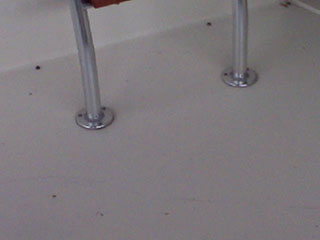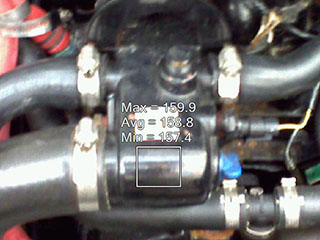Services
Condition and Value - Pre-purchase Surveys
A Condition and Value Survey involves a thorough inspection of the vessel's structural integrity and all systems on the vessel. Our survey will alert the vessel owner or prospective buyer of deficiencies that could adversely affect the safety or value of the vessel. Many vessel casualties are due to improper systems maintenance. Our survey will identify existing deficiencies and potential problems that can be avoided by taking preventative measures.
Survey Content (Yachts and Small Craft)
- Hull, Deck and Superstructure
- Hull Construction
- Deck Construction
- Hull to Deck Joint
- Deck Fittings
- Superstructure
- Bridge Deck
- Cabin Appointments
- Joinery and Finish
- Bulkhead Inspection
- General Layout and Inventory
- General Condition
- Propulsion
- Exterior Engine Inspection
- Fuel System Inspection
- Cooling System Inspection
- Electrical Systems
- DC Systems and Wiring
- AC Systems and Wiring
- Generator Systems
- Fresh Water Systems
- Sanitation Systems
- Steering Systems
- Ground Tackle
- Electronics and Navigation Systems
- Thru-Hull Fittings
- Bonding System
- Safety Equipment
- Bilge Pumps
- Air Conditioning Systems
- LPG Systems
- Out of Water Inspection of the Hull
- Sea Trial
Reinsurance Survey
The reinsurance survey is a dressed down version of the pre-purchase survey typically conducted for current vessel owners at the behest of their insurance companies or for vessel owners seeking to change insurance carriers and need an updated survey to accomplish the application.
The survey will cover all aspects of the vessel important to the insurer including, structure, safety related systems and gear, electrical and raw water systems and anything related to the safe operation of the vessel. The survey is basically a risk assessment report and, although detailed, do not include testing of non-safety related systems.
Depending upon the requirements of the insurer, the vessel may be surveyed without haul out and almost never requires a sea trial.
Damage Survey
The damage survey can take many forms depending on the particular assignment and nature of damage. The survey will take into consideration everything from vessel operator and passenger statements, outside witness accounts, prior vessel records, vessel inspection and collection of data related to the condition of the vessel and extent of damage. This should include a complete description including the area damaged in relation to the hull or compartment, the equipment, fittings and appurtenances found damaged.
Reports will typically include recommendations for repairs or replacements and statements related to the handling of the repairs including towing, personnel safety, hazardous material handling, clean up and testing.
Damage surveys are typically conducted for the underwriter or owner of the vessel and are not biased to one or the other.
An important part of any damage survey is determining the Proximate Cause of damage.
Accident Reconstruction
We have a great deal of experience in the field of accident reconstruction including fire damage claims, flooding and sinking claims, grounding and impact/collision claims and death involved claims including Carbon Monoxide related cases.
The ability to reconstruct a marine accident is a learned skill that comes from attending training courses taught by the experts in the business. The forensics skills learned in the classroom are put to use in every accident case.
Forensic skills and attention to detail are vital to our ability to meet the expectations of our clients.
Thermal Imaging
Our Thermal Imaging Professionals provide a wide array of Radiometric Thermal Imaging Services for non-destructive testing of materials, structural integrity, electrical systems and engine components and cooling systems. Applications are unique to environmental surroundings and the ability to control thermal transitions.
We use state of the art thermal imaging equipment to perform their inspections and confirm findings with conventional equipment. Applications span well beyond the marine industry and include residential and commercial structure inspections for water damage, leaks and a variety of other applications. This service has proved invaluable to our clients who suffered damage to their properties resulting from hurricanes, tropical storms, construction deficiencies, etc.
After widespread damage, such as that from hurricanes, concentrated in a specific geographical location, many home and business owners are left to deal with insurance adjusters that are only equipped with the experience and knowledge to offer settlement based on visible damage. Our thermal imaging service can identify water damage to structures, insulation, flooring, etc. that is not visible to the naked eye and has saved thousands of dollars for our clients.
Following are several examples of the services we provide:
Residential Structure Water Intrusion:
The inspection revealed more than 3 times the damage sighted by the adjuster for the insurance company. The following pictures depict the thermal image, clearly showing the water damage, and the visible image (taken simultaneously) which shows no clear visible indication of the extent of water damage in this area.
Composite Hull Delamination:
This vessel was washed ashore into a stand of trees by a tidal surge from a recent hurricane. Repair facilities have a difficult task in preparing estimate for repair when the extent of damage cannot be determined by conventional means without destructive testing (drilling, cutting, etc.) and even then the full extent of damage may not be known until repairs are underway. Increasingly, insurance companies are allowing for the expense of thermal imaging to accurately determine the extent of damage to a vessel. The following photos clearly depict the delamination suffered in one of many areas on this vessel.
Composite Hull Water Intrusion:
When performing thermal imaging inspections of composite hulls, it is possible to detect all anomalies during the course of a single inspection such as structural bonding integrity of stringers and bulkheads, delamination and water intrusion composites and coring materials. The first photos clearly show water intrusion that has entered this fully cored hull over the years and originates at a small vent fitting on the hull side.
The second photo depicts water intrusion into a balsa cored cockpit sole on a sportfishing vessel.
Engine Temperature Scans:
Finding hot spots on engines has never been easier. Our thermal imaging allows the entire engine to be recorded with only 2 or 3 thermal photos. Each photo records 72,000 pixels, each with a unique and accurate temperature designation. Our software allows us to easily record and detail problem areas on the engine and appurtenances. Heat exchangers can be scanned for blockage problems, injector problems can be detected early and a variety of other early detection findings can be sighted from the same images. The following 2 sets of photos depict a view of a marine engine under full load at sea trial and a heat exchanger scan.

